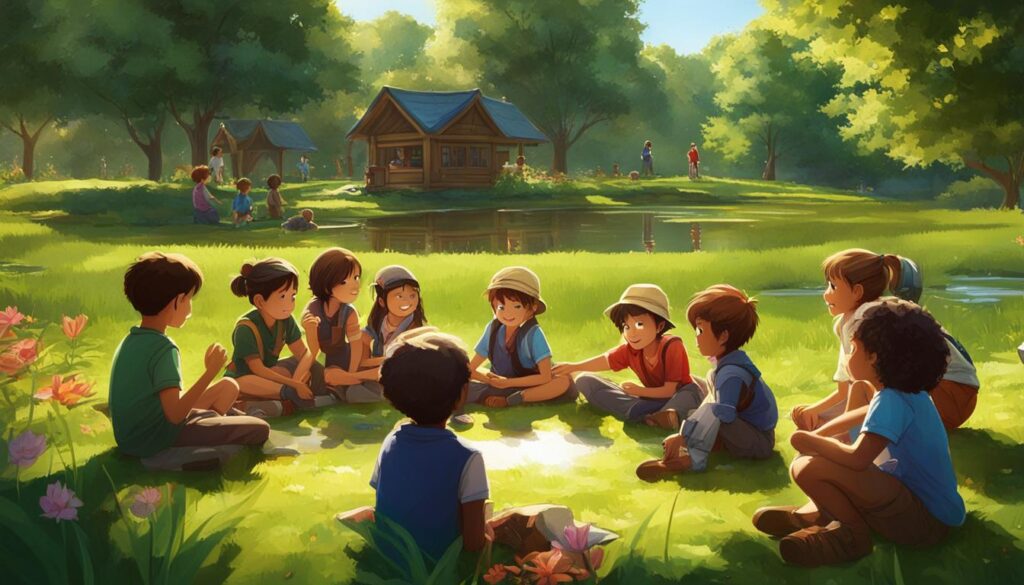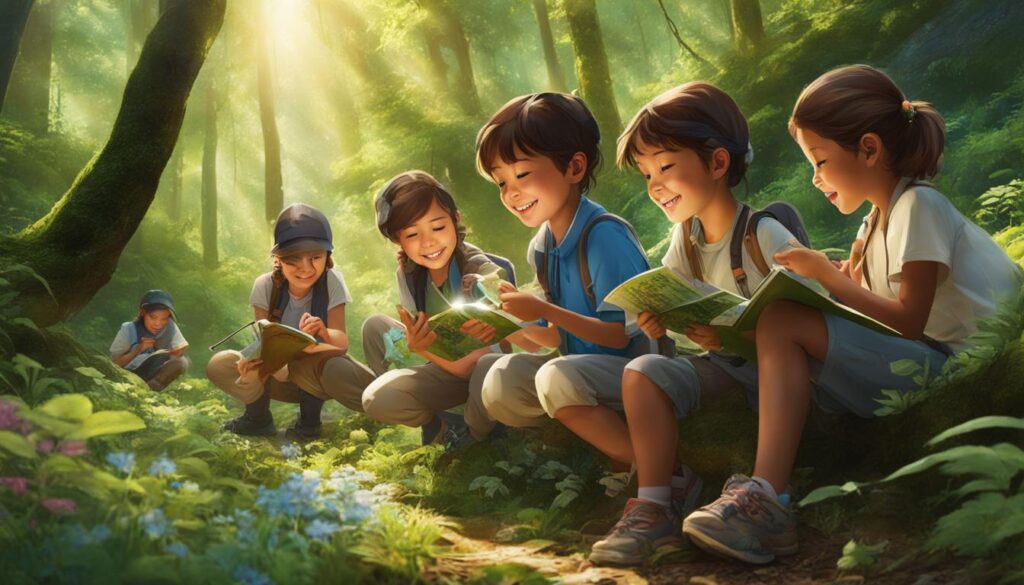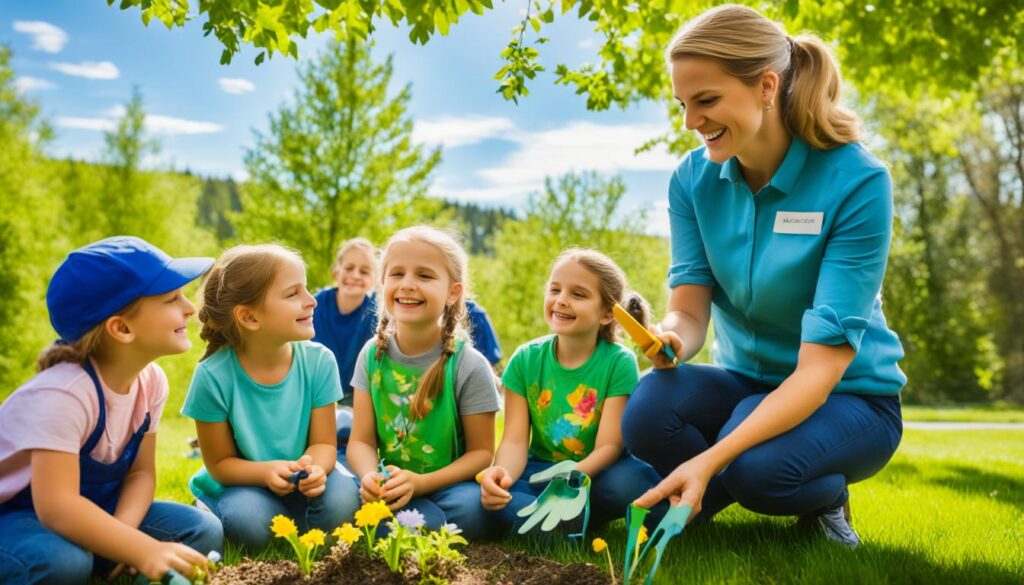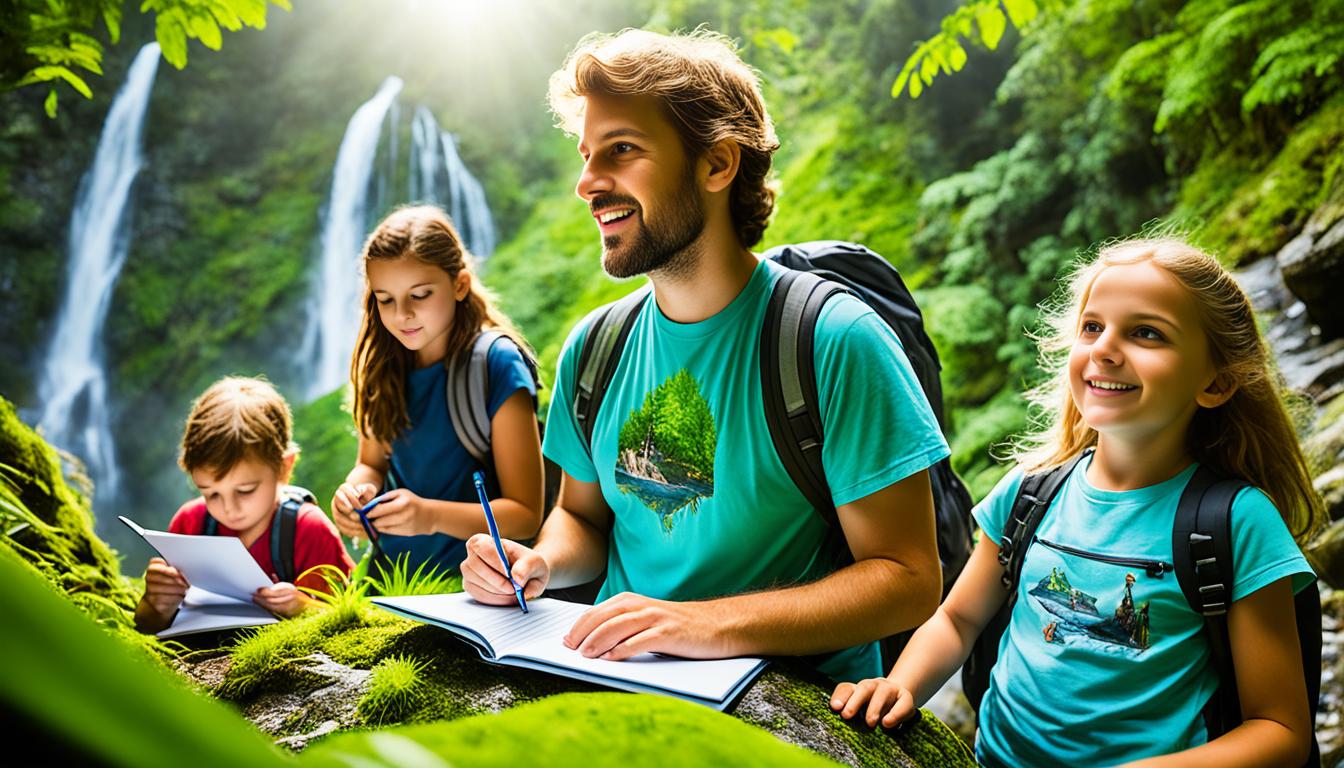Welcome to Nature’s Classroom, where education comes alive in the great outdoors! Our innovative approach to education combines outdoor learning adventures with experiential learning, providing students with a unique and immersive educational experience. Through hands-on activities, wilderness exploration, and environmental education, students not only gain knowledge but also develop essential life skills and foster personal growth.
At Nature’s Classroom, we believe that nature is the ultimate classroom. Our nature-based education programs are designed to foster a love for learning while promoting environmental stewardship. Students have the opportunity to engage in outdoor learning activities, such as hiking, camping, and wildlife observation, that not only enhance their understanding of the natural world but also promote physical health and well-being.
Our outdoor education curriculum goes beyond traditional classroom subjects, integrating adventure education and experiential learning into the curriculum. Students have the chance to learn through adventure, building teamwork and problem-solving skills as they tackle outdoor challenges. We believe that education through adventure sparks curiosity, creativity, and a lifelong passion for learning.
Join us as we explore the exciting world of outdoor learning adventures education and discover the transformative power of hands-on learning in the great outdoors!
Key Takeaways:
- Outdoor learning adventures education combines experiential learning with nature-based education.
- Engaging in outdoor activities promotes physical health and well-being among students.
- Adventure education and experiential learning enhance teamwork and problem-solving skills.
- Nature’s Classroom fosters a love for learning and environmental stewardship.
- Hands-on learning outdoors sparks curiosity and creativity in students.
Encountering Nature’s Classroom: A Holistic Approach to Education
Nature’s Classroom embodies a holistic approach to education, recognizing the profound connection between the mind, body, and environment. This unique educational philosophy fosters a deep appreciation for the natural world while nurturing personal growth and a love for learning. By employing outdoor learning adventures education, Nature’s Classroom immerses students in nature-based education, enabling them to develop a holistic understanding of the world around them through experiential learning.
The Ethos Behind Nature’s Classroom
The ethos behind Nature’s Classroom centers around providing students with transformative opportunities to connect with nature and develop a strong sense of environmental stewardship. By engaging students in hands-on outdoor learning experiences, Nature’s Classroom cultivates a deep appreciation and respect for the natural environment. This ethos is driven by the belief that by immersing students in nature, they will develop a lifelong love for the planet and a desire to protect it.
Physical Health Meets Experiential Learning
Physical health is an integral component of the Nature’s Classroom approach. The outdoor learning adventures education not only stimulates intellectual growth but also encourages physical fitness and well-being. Through outdoor activities, such as hiking, team sports, and environmental exploration, students engage in experiential learning while simultaneously promoting their physical health. This holistic integration of physical education and experiential learning enhances student well-being and fosters a balanced approach to education.
The Impact of Outdoor Learning Activities on Student Well-being
Outdoor learning activities have a profound impact on student well-being. These activities not only contribute to physical health but also promote the development of healthy habits. Through outdoor education, students learn to appreciate nature, overcome challenges, and develop resilience.
Building Healthy Habits Through Outdoor Education
Outdoor education programs provide students with opportunities to engage in a variety of outdoor activities that promote healthy habits. Whether it’s hiking, biking, or participating in team sports, these activities encourage students to be physically active and lead active lifestyles. By spending time outdoors and engaging in physical activity, students develop a greater appreciation for their own well-being and learn healthy habits that can last a lifetime.
Additionally, outdoor education programs often incorporate nutrition education and promote healthy eating habits among students. Through hands-on experiences such as gardening or cooking classes, students learn about the importance of nutritious foods and develop a deeper understanding of the connection between their diet and overall well-being.
Personal Growth Through Nature-Based Challenges
Nature-based challenges present unique opportunities for personal growth and development. When students are faced with outdoor challenges such as navigating through a wilderness trail or conquering a rock climbing wall, they are forced to step out of their comfort zones and overcome their fears. These experiences build confidence, resilience, and a sense of accomplishment.
Outdoor learning adventures provide students with a chance to develop essential life skills such as problem-solving, decision-making, and teamwork. By working together to overcome nature-based challenges, students learn the value of collaboration and develop effective communication skills.
Furthermore, the connection to nature and the opportunity to learn from the environment fosters personal growth and self-understanding. Students develop a deeper appreciation for the natural world and their place within it, leading to a greater sense of purpose and fulfillment.

Outdoor Education Programs: Combining Curriculum with Adventure
Outdoor education programs offer a unique and immersive learning experience that combines traditional curriculum with exciting adventures. These programs integrate hands-on learning, experiential activities, and outdoor adventures to enhance students’ understanding of various subjects.
By stepping outside the confines of a traditional classroom setting, students have the opportunity to engage with the natural world and apply their knowledge in real-life situations. This experiential learning approach fosters a deeper understanding of academic concepts and allows students to develop important life skills.
Curriculum integration is a key component of outdoor education programs. Students are able to make meaningful connections between different subjects as they explore the outdoors and participate in hands-on activities. For example, a science lesson on plant life can be integrated with a hiking expedition to observe different plant species in their natural habitats.
One of the benefits of outdoor education programs is the ability to cater to different learning styles. Hands-on learning allows students to actively engage in their education, promoting a deeper level of understanding and retention of knowledge. This approach also fosters creativity, critical thinking, problem-solving, and teamwork skills.
The table below showcases the wide range of educational experiences that outdoor education programs offer:
| Subject | Outdoor Learning Adventure |
|---|---|
| Science | Hiking to study ecosystems and biodiversity |
| History | Visiting historical sites and reenacting historical events |
| Geography | Orientation and map reading skills through orienteering activities |
| Physical Education | Rock climbing, kayaking, or team building activities |
| Art | Outdoor painting or photography sessions |
These outdoor learning adventures not only enhance students’ academic learning but also contribute to their personal and social development. Through these immersive experiences, students gain a sense of appreciation for the natural world, develop environmental stewardship, and build a strong connection with their peers and instructors.
Outdoor education programs provide a unique opportunity for students to integrate curriculum with adventure, resulting in memorable educational experiences that foster a lifelong love for learning.
Outdoor Learning Adventures Education: Choosing Your Own Path
When it comes to outdoor learning adventures education, students have the freedom to choose their own path and customize their learning experience. This unique approach allows students to explore their interests and engage in hands-on activities that resonate with their passions. Through customized field group classes, students can delve deeper into subjects that captivate their curiosity.
Field group classes offer students the opportunity to learn in a collaborative environment, where they can interact with their peers and exchange ideas. These classes are designed to foster teamwork, communication, and problem-solving skills, while also encouraging students to take ownership of their learning journey. By working together in the field, students develop a sense of camaraderie and strengthen their connections with nature.
Lessons in outdoor learning adventures education are carefully adapted to cater to student interests. This personalized approach ensures that students remain engaged and motivated throughout their learning experience. Whether it’s studying ecosystems, conducting experiments, or exploring the wilderness, students can pursue their passions and deepen their understanding of the natural world.

By aligning lessons with student interests, outdoor education programs create a more meaningful and relevant learning experience. Students are encouraged to ask questions, think critically, and apply their knowledge in practical ways. This personalized learning approach not only enhances academic achievement but also nurtures a lifelong love for learning.
Outdoor learning adventures education empowers students to choose their own path, discover their passions, and develop a deeper connection with the natural world. Through customized field group classes and adapted lessons, students have the opportunity to create a personalized learning experience that is engaging, impactful, and tailored to their unique interests.
Outdoor Adventure Education Beyond the Classroom Walls
Outdoor adventure education offers a unique and immersive learning experience that extends beyond the confines of the classroom walls. This approach provides students with the opportunity to connect with nature, learn valuable life skills, and develop a sense of environmental stewardship. Through a variety of activities, students not only gain knowledge but also foster personal growth and a deeper appreciation for the natural world.
Campfire Sing-Alongs and Nighttime Hikes
One of the highlights of outdoor adventure education is the chance to participate in campfire sing-alongs and nighttime hikes. Gathered around the flickering flames, students can share songs, stories, and laughter, building bonds with their peers and creating lasting memories. As the night falls, guided nighttime hikes introduce students to the wonders of the nocturnal world, allowing them to witness the beauty of nature under the starry sky and learn about the importance of conservation in preserving these habitats.
“Sitting around the campfire and singing songs together fosters a sense of community and belonging. It creates a space where students can relax, connect with nature, and form lasting friendships.”
Fostering Environmental Stewardship
Outdoor adventure education emphasizes environmental stewardship and encourages students to become advocates for the conservation of our natural resources. Through hands-on activities and immersive experiences, students develop a deep respect for the environment and understand the importance of sustainable practices.
Engaging in outdoor adventures, students witness firsthand the interconnectedness of all living things, fostering a sense of responsibility for the earth and its diverse ecosystems. By experiencing the wonders of nature, students are more likely to become passionate advocates for environmental conservation and make sustainable choices in their daily lives.
“By immersing students in outdoor environments and providing them with opportunities to explore, outdoor adventure education instills a sense of awe and wonder in the natural world. This connection, in turn, inspires a desire to protect and preserve our environment for future generations.”
Outdoor Adventure Education Beyond the Classroom Walls
| Benefits of Outdoor Adventure Education | Examples |
|---|---|
| Enhances physical fitness and well-being | Campfire sing-alongs, nighttime hikes |
| Promotes teamwork, communication, and problem-solving | Collaborative outdoor challenges |
| Develops a sense of environmental stewardship | Hands-on conservation activities |
| Encourages personal growth and resilience | Overcoming outdoor obstacles and challenges |
Nature-Based Education: Learning Through Land Stewardship
Nature-based education is a transformative approach that focuses on learning through land stewardship. By actively engaging in activities such as environmental conservation, gardening, and habitat preservation, students not only gain knowledge about the natural world but also develop a profound sense of responsibility and empathy towards the environment.
Through hands-on learning outdoors, students become immersed in real-world experiences that foster experiential learning. They have the opportunity to observe and interact with nature firsthand, gaining a deeper understanding of ecological systems and the importance of preserving biodiversity. This experiential learning approach allows students to connect theoretical concepts with practical application, enhancing their overall learning experience.

One of the key principles of nature-based education is instilling a sense of stewardship in students. By actively participating in environmental conservation projects, such as cleaning up local parks or planting native trees, students develop a strong connection to the natural world and recognize the importance of taking care of the Earth. This hands-on approach not only benefits the environment but also nurtures a sense of civic responsibility and a commitment to making a positive impact.
Furthermore, nature-based education promotes interdisciplinary learning. Students have the opportunity to explore various subjects, including science, geography, and social studies, through a lens focused on the environment. This integrated approach allows students to make connections between different disciplines and develop a holistic understanding of the world around them.
By engaging in nature-based education and learning through land stewardship, students gain more than just academic knowledge. They develop a deep appreciation for the natural world, become ambassadors for environmental sustainability, and acquire essential skills such as problem-solving, critical thinking, and collaboration.
Environmental Education: Integrating Hands-On Learning with Academics
Environmental education goes beyond traditional classroom learning by integrating hands-on experiences with academic subjects. This approach provides students with a holistic understanding of the environment and its interconnectedness with various disciplines.
One key component of environmental education is wilderness education, which plays a crucial role in immersing students in natural environments. Through wilderness education, students have the opportunity to explore and appreciate the beauty of the wilderness firsthand.
This immersive experience allows students to develop a deep connection with nature and gain a firsthand understanding of the importance of environmental conservation. Wilderness education enables students to apply academic concepts in real-world settings and develop a sense of environmental stewardship.
By engaging in hands-on activities and outdoor learning adventures, students not only gain knowledge but also develop critical thinking, problem-solving, and collaboration skills. They learn to appreciate the importance of the environment and become active participants in creating a sustainable future.
Through the integration of hands-on learning and academics, environmental education provides students with a well-rounded education that fosters a love for learning and a sense of responsibility towards the environment. It equips students with the skills and knowledge necessary to become environmentally-conscious citizens and future leaders.
Outdoor Classroom Experiences: From Low Ropes Courses to Living Curriculum
The outdoor classroom provides a diverse range of experiences that go beyond traditional learning methods. From engaging in low ropes courses to immersing in living curriculum, students have the opportunity to learn and grow in unique ways. These experiences not only foster collaboration, communication, and problem-solving but also instill important values of teamwork and trust.
One popular activity in the outdoor classroom is the low ropes course. This hands-on experience involves navigating through a series of obstacles and challenges designed to promote teamwork and trust. As students work together to overcome the course, they learn the importance of communication, cooperation, and relying on one another. This collaborative environment allows students to develop essential skills that can be applied in various aspects of their lives.

In addition to low ropes courses, the outdoor classroom also embraces the concept of living curriculum. This approach brings academic subjects to life in natural settings, allowing students to connect their learning directly to the world around them. Whether it’s studying ecosystems in a nearby forest or conducting experiments in a garden, living curriculum provides an immersive and hands-on learning experience.
Through outdoor classroom experiences, students not only gain knowledge in subjects such as science, geography, and history but also develop a deeper understanding of the interconnectedness of the natural world. They learn to appreciate and respect the environment while honing their critical thinking, problem-solving, and decision-making skills.
The outdoor classroom truly offers a rich and holistic learning environment, where students can learn and thrive both academically and personally. By actively engaging in outdoor activities and experiences, students develop a love for learning, curiosity, and a sense of adventure that extends beyond the classroom walls.
Adventure-Based Learning: An Experiential Approach to Education
Adventure-based learning offers an immersive and experiential approach to education, providing students with valuable opportunities for hands-on learning and exploration. Through engaging in real-world experiences, students develop a deeper understanding of the subjects they are studying, while also building essential life skills.
Emphasizing Safety While Encouraging Exploration
When it comes to outdoor education, safety is of utmost importance. Adventure-based learning programs prioritize the well-being of students, ensuring that proper safety measures are in place throughout all activities. Trained instructors and guides oversee each adventure, providing expert supervision and guidance to ensure a safe and enriching experience.
While safety is a priority, adventure-based learning also encourages students to step out of their comfort zones and explore new challenges. By engaging in outdoor adventures such as hiking, rock climbing, or team-building activities, students are able to push their boundaries, overcome obstacles, and develop resilience.
Enhancing Social-Emotional Learning Skills
Adventure-based learning goes beyond academic knowledge and fosters the development of social-emotional learning skills. Through outdoor activities, students learn to communicate effectively, collaborate with their peers, and develop problem-solving abilities. These skills are not only valuable in the context of outdoor education but also transferable to various aspects of life.
Engaging in adventure-based learning also promotes personal growth and self-confidence. As students face new challenges and experience personal achievements, they develop a sense of empowerment and a belief in their own capabilities. This can have a positive impact on their overall emotional well-being and self-esteem.
Adventure-based learning offers a transformative educational experience that combines experiential learning, safety, and social-emotional skill development. By stepping out of the traditional classroom setting, students are able to engage in hands-on learning, gain a deeper understanding of themselves and the world around them, and develop skills that will benefit them throughout their lives.
Conclusion
Celebrating 50 Years of Outdoor Learning Adventures
In conclusion, Nature’s Classroom has been transforming education through outdoor learning adventures for 50 years. With a deep commitment to experiential learning and a holistic approach to education, Nature’s Classroom has provided countless students with unforgettable experiences in nature.
Over the past half-century, outdoor learning adventures have become an integral part of education, offering students the opportunity to develop crucial life skills, foster personal growth, and cultivate a love for learning. Through hands-on activities, students have engaged with the natural world, building healthy habits and resilience along the way.
Looking Forward: The Future of Outdoor Learning in Education
As we celebrate 50 years of outdoor learning adventures, we look forward to the future of outdoor education and its continued integration into mainstream education systems. The benefits of outdoor learning are becoming increasingly recognized, and educators are embracing the power of nature to enhance learning outcomes.
The future of outdoor learning holds exciting possibilities, from further curriculum integration to the use of advanced technology in outdoor classrooms. With ongoing research and innovation, we can continue to create meaningful educational experiences that connect students with nature and equip them with the skills they need to thrive in an ever-changing world.
FAQ
What is Nature’s Classroom?
Nature’s Classroom is an innovative approach to education that harnesses the power of outdoor learning adventures.
What is the ethos behind Nature’s Classroom?
The ethos behind Nature’s Classroom is to provide students with opportunities to connect with nature, develop a sense of environmental stewardship, and cultivate a love for learning.
How does Nature’s Classroom incorporate physical health into education?
Nature’s Classroom recognizes the importance of physical health in education and incorporates outdoor activities that promote physical fitness and well-being.
What impact do outdoor learning activities have on student well-being?
Outdoor learning activities contribute to physical health and promote the development of healthy habits among students.
How do outdoor education programs enhance students’ learning experiences?
Outdoor education programs combine traditional curriculum with adventure, integrating hands-on learning, experiential activities, and outdoor adventures to enhance students’ understanding of various subjects.
Can students tailor their learning experience in outdoor learning adventures education?
Yes, outdoor learning adventures education offers customized field group classes and adapts lessons to student interests, allowing students to choose their own path and make their learning experience more engaging and meaningful.
What role does outdoor adventure education play in fostering environmental stewardship?
Outdoor adventure education provides unique opportunities for students to connect with nature and peers, fostering environmental stewardship and promoting hands-on learning outdoors.
What is nature-based education?
Nature-based education emphasizes learning through land stewardship and engages students in activities such as environmental conservation and gardening to develop a sense of responsibility and empathy towards the environment.
How does environmental education integrate hands-on learning with academics?
Environmental education integrates hands-on learning with academic subjects, providing a holistic understanding of the environment and its interconnectedness with various disciplines. Wilderness education plays a crucial role in this process by immersing students in natural environments.
What lessons can be learned through outdoor classroom experiences?
Outdoor classroom experiences provide valuable lessons in collaboration, communication, and problem-solving, through activities such as low ropes courses and living curriculum.
How does adventure-based learning enhance education?
Adventure-based learning offers an experiential approach to education, allowing students to learn through hands-on experiences and exploration. While safety is paramount, adventure-based learning encourages students to develop important social-emotional learning skills.
Source Links
- https://www.ecfs.org/gallery/5th-grade-students-embark-on-an-outdoor-adventure-to-natures-classroom/
- https://www.naturesclassroom.org/
- https://www.naturesclassrooms.com/classes/low-ropes/

